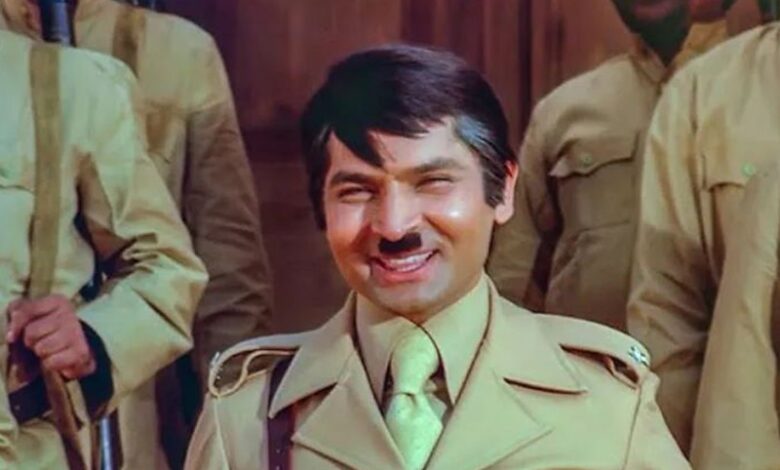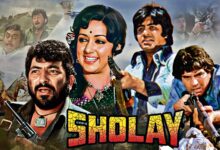
In Memoriam: Asrani’s Legacy
Born: January 1, 1941, Jaipur, Rajasthan
Passed: October 20, 2025, Mumbai
Career Span: 1967–2023
Notable Films: Sholay (1975), Chupke Chupke (1975), Hera Pheri (2000)
Awards: Filmfare Best Comedian (1974, 1977), Gujarat State Awards (1986)
Survived by: Wife Manju Asrani, son Naveen Asrani
Fun Fact: His iconic Sholay jailer role was inspired by exaggerated historical mannerisms, making it a pop culture staple.
Stream Asrani’s classics on Approach Bollywood to relive his magic.
Mumbai, October 20, 2025 – The Indian film industry is cloaked in grief as Govardhan Asrani, fondly known as Asrani and immortalized as the ‘Angrejo Ke Jamane Ke Jailer’ from Sholay, passed away today at 84 after a prolonged illness. The veteran actor, whose career spanned over five decades and more than 350 films, left an indelible mark on Bollywood with his unparalleled comic timing and versatile performances. His death, confirmed by family and close associates, came hours after he shared a heartfelt Diwali message on Instagram, leaving fans and colleagues devastated.
Asrani breathed his last around 3–4 p.m. IST at Bharatiya Arogya Nidhi Hospital in Juhu, Mumbai, where he was admitted four to five days ago for severe breathing issues caused by fluid accumulation in his lungs. His manager, Babubhai Thiba, told Approach Bollywood, “Asrani Sahab had been unwell for two weeks. He was clear—no public fuss. He wanted peace.” The last rites were performed privately at Shastri Nagar Crematorium in Santacruz this evening, attended only by his wife, actress Manju Asrani, their son Naveen, a dentist in Ahmedabad, and a few close confidants. A nephew also verified the news, underscoring Asrani’s wish for a quiet farewell.
In a poignant final act, Asrani posted an Instagram story earlier today, filled with festive Diwali clips and warm wishes, a testament to his enduring connection with fans. A family statement released post-cremation captured his essence: “He lived to make people laugh and left us with a legacy of joy.”
A Journey from Jaipur to Bollywood’s Heart
Born on January 1, 1941 (some sources cite 1940), into a middle-class Sindhi Hindu family in Jaipur, Asrani’s early life was rooted in simplicity. With a father in the carpet business and seven siblings—four sisters and three brothers—he showed little interest in academics, particularly mathematics. After completing his education at St. Xavier’s School and Rajasthan College, Jaipur, he worked as a voice artist at All India Radio to fund his studies. His passion for acting led him to train under Sahitya Kalbhai Thakkar from 1960 to 1962 before he moved to Mumbai.
In 1962, chance meetings with industry stalwarts Kishore Sahu and Hrishikesh Mukherjee prompted him to join the Film and Television Institute of India (FTII) in Pune from 1964 to 1966. His Hindi debut came in 1967 with Hare Kaanch Ki Choodiyan, alongside Biswajeet, while he simultaneously starred as a lead in Gujarati cinema, appearing in five films from 1967 to 1969. His big break arrived with Hrishikesh Mukherjee’s Satyakam (1969) and Mere Apne (1971), setting the stage for a prolific career.
The Comedy Maestro: Records and Iconic Roles
Asrani’s 1970s reign was unmatched, with a record 101 film appearances in the decade, followed by 107 in the 1980s, as a comedian and character actor. His collaboration with Rajesh Khanna in 25 films, from Bawarchi (1972) to Ghar Parivaar (1991), cemented his status as the hero’s quintessential quirky friend. Films like Koshish (1972), Parichay (1972), Abhimaan (1973), and Namak Haraam (1973) showcased his ability to blend humor with emotional depth under directors like Mukherjee, Gulzar, and Atma Ram.
His defining moment came in 1975 with Sholay, where his portrayal of the eccentric jailer—complete with a mock-German accent and the iconic line “Ham angrezo ke zamane ke jailer hain”—became a cultural phenomenon. The role, inspired by exaggerated historical mannerisms, remains one of Bollywood’s most mimicked performances. Asrani’s comedic brilliance lit up classics like Chupke Chupke (1975) as the hapless driver, Rafoo Chakkar (1975), Chhoti Si Baat (1976), Balika Badhu (1976), Pati Patni Aur Woh (1978), and Hamare Tumhare (1979). He also took on dramatic roles, such as the villainous brother in Koshish, a double role in Bidaai (1974), and a romantic qawwali singer in Nikaah (1982).
Asrani directed six films between 1974 and 1997, starting with the Gujarati hit Amdavad No Rikshawalo (1974), featuring a Kishore Kumar song picturized on him. His Hindi directorials included Chala Murari Hero Banne (1977), which he wrote and starred in, Salaam Memsaab (1979), Hum Nahin Sudhrenge (1980), Dil Hi To Hai (1992), and Udaan (1997). In Gujarati cinema, he was a leading man from 1972 to 1984 in films like Saat Qaidi and Maa Baap, later transitioning to character roles until 2012.
The 1980s and 1990s saw him adapt to action-driven cinema, starring in Himmatwala (1983), Maqsad (1984), Teri Meherbaniyan (1985), Jo Jeeta Wohi Sikandar (1992), Taqdeerwala (1995), and Bade Miyan Chote Miyan (1998). The 2000s brought a comedy revival with Priyadarshan and David Dhawan films like Hera Pheri (2000), Hulchul (2004), Garam Masala (2005), Bhagam Bhag (2006), Malamaal Weekly (2006), Welcome (2007), De Dana Dan (2009), and Bol Bachchan (2012). He took a rare serious role in Kyon Ki (2005).
Beyond films, Asrani appeared in TV shows like Natkhat Narad (1985) and Partners Trouble Ho Gayi Double, the web series Permanent Roommates (2018) as Mikesh’s grandfather, and voiced Zazu in the Hindi The Lion King. He judged the Naya Andaz competition in 2010 and featured in ads until 2019. His final film was Non Stop Dhamaal (2023).
Honors and Personal Life
Asrani won Filmfare Awards for Best Comedian for Aaj Ki Taaza Khabar (1974), co-starring his wife Manju, and Balika Badhu (1977). He earned the Shama Sushama Award for Anhonee (1973) and Gujarat State Awards for Best Actor and Director for Saat Qaidi (1986). From 1988 to 1993, he served as a director at FTII Pune. In the 1980s, he co-founded a Gujarati production company with Dinesh Hingoo and others, though he faced financial losses in investments by 1991.
Asrani met Manju Bansal on the sets of Aaj Ki Taaza Khabar and Namak Haraam. They married in 1973 and collaborated on films like Tapasya (1975) and Hum Nahin Sudhrenge (1980). Their son, Naveen, chose a career outside cinema.
A Flood of Tributes
Bollywood and fans mourned Asrani’s loss on X, with Akshay Kumar posting, “The king of comic timing, Asrani ji, is no more. His laughter was our treasure.” David Dhawan called him “a joy in every frame.” A viral fan post read, “Alvida, Angrejo Ke Jamane Ke Jailer! Your comedy was our Diwali.” Clips of his Sholay and Chupke Chupke scenes trended online, reflecting his timeless appeal.
Asrani’s legacy is a tapestry of laughter, versatility, and humility. For Approach Bollywood users, his films remain a click away, ready to spark joy. As India celebrates Diwali, the industry bids farewell to a star whose light will never fade. Rest in peace, Asrani.
Download Approach Bollywood App Now. https://play.google.com/store/apps/details?id=com.approach.bollywood&hl=en_IN









